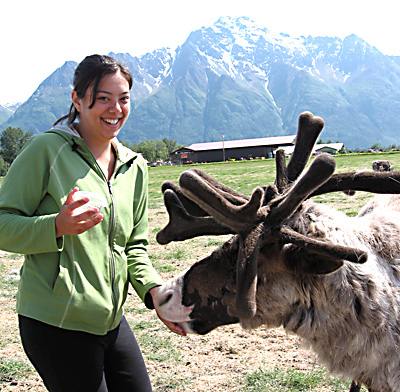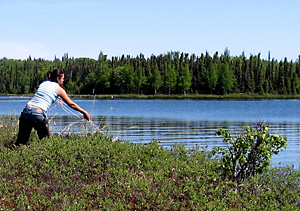Rachel Chock

In December 2009 I was offered a competitive NSF-funded research position in Chile that will begin in June 2010. I will be working with Dr. Loren Hayes from University of Louisiana Monroe and Dr. Luis Ebensperger from Universidad de Catolica in Santiago, Chile. I will be studying social behavior in degus (Octodon degus), and my focus will be on allonursing by this mammal in the lab and the field. I am looking forward to a new avenue of research and to being involved in international field work! I expect this will help me focus on a field of interest for graduate school. I plan to apply next year.
Earlier in 2009 I traveled in Asia and Australia which was a wonderful experience- but I decided it was time to get back into studying animal behavior which I love.
The summer after I defended my Masters thesis (2008) I traveled to Moise, MT to work with members John Byers’ lab from University of Idaho during pronghorn fawning season. As an observer I spent days hiking the National Bison Range, sitting in blinds scouting and identifying females and their fawns with binoculars and a spotting scope. I guided fellow researchers to the location of hidden fawns, helped tag, sex, and measure the 1-3 day old babies, helped take tissue samples for a long-term study on the effects of inbreeding on an isolated population.
I spent the last month of that summer in Lake George, NY working with a crew of eight to control the spread of the invasive aquatic weed, Eurasian watermilfoil, throughout the lake. Using SCUBA equipment, we rolled 8’x50′ pvc panels over acres of the weeds, staking them down with metal rebar, in addition to handpicking plants in rocky areas. Physically demanding work; I learned to function in black-out conditions and got used to getting tangled by 10′ plants!
As I traveled home to the west coast in August of 2008 I presented a talk at the 45th Annual Meeting of the Animal Behavior Society, which was held at Snowbird, UT. This was my second time at the conference. It was my first oral presentation and in it I described my Masters research. It seemed to go over very well, which was really exciting. It was entitled: Re-emergence of ancestral plasticity and the loss of a rare phenotype in threespine stickleback.
Rachel Chock, 5th-year Masters
I am in the 5th year M.A. program in Biology, and received my B.A. in environmental science/conservation biology from Clark in May 2007. I joined the Foster-Baker Laboratory during my junior year when I met with Susan Foster to talk about my interest in adding more biology classes to my environmental science major, and she introduced me to the (still unofficial at the time) conservation biology track and I shifted my whole undergraduate career. My early work in the laboratory resulted in co-authorship on a paper presented by Dr. Foster at the 5th International Stickleback Symposium in Anchorage Alaska in 2006.
 Master’s Research:
Master’s Research:
My primary interests lie in the areas of conservation biology and animal behavior. I am currently looking at the effects of housing development on water chemistry and the subsequent shift in stickleback feeding, mating, and anti-predator behavior in Lynne Lake, Alaska. Changes in productivity appear to be altering foraging regimes in this unusual limnetic population in a direction that could result in contemporary evolution to a form that is behaviorally benthic, rather than limnetic. This would be a serious regional loss of diversity as the Lynne Lake population is the only behavioral limnetic identified in the Cook Inlet region of Alaska to date. I am also interested in comparing the behavior of Lynne Lake fish to that of other populations in the region, and to that of limnetic populations in British Columbia to better understand the behavioral characteristics of these two important behavioral ecotypes. I expect this research to result in one publication in a conservation journal, and one devoted to the comparative study of behavior.
Outside the laboratory:
I am originally from Redwood City, California. I love to travel and my work with stickleback took me to British Columbia and Alaska this past summer where I spent many cold hours floating around in the lakes and watching the fish. I got to do other fun things like climb on a glacier, meet some reindeer, and commandeer a canoe. As an undergrad I was very involved with the Equestrian team and intramural sports (4 years of soccer championships!), and participated in Clark’s Model United Nations, the outing club, and ballroom dancing. I studied abroad in England at the University of East Anglia the spring semester of my junior year.
Publication:
Baker, J.A., R. Y. Chock, R. Elsemore, M. A. Wund, S. A. Foster (In press). Predation History and Vulnerability: Conservation of Stickleback Populations.
Poster presentation:
The 44th Annual Meeting of the Animal Behavior Society, July 2007. Anthropogenic change and potential loss of a rare behavioral phenotype without extinction.
Awards:
Carlson Scholar, Clark University 2003-2007
Charles Henry Turner Award, Animal Behavior Society, 2007